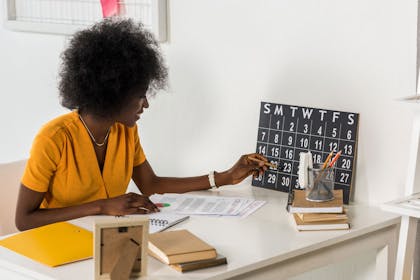Can you get pregnant at any time of the month?
Advertisement Promotion with Clearblue

Whether you're trying for a baby or wondering if you might be pregnant, you may be asking yourself if you can get pregnant at any time of the month. Find out when in your menstrual cycle you're most likely to conceive, plus the chances of conceiving at other times of the month.
You may already know that you're most likely to conceive a baby around the time of ovulation. But how can you tell when you're ovulating? And does that mean you don't need to use contraception for the rest of the month? We dig into the research to bring you the answers.
Can a woman get pregnant at any time of the month?
Yes, it is possible to get pregnant if you have sex at any time of the month, including on your period. However, you're much more likely to get pregnant if you have sex at one particular time of month: around the time of ovulation.
To understand this, it helps to know a bit about how your menstrual cycle works.
FREE NEWBORN NAPPIES
All girls are born with all the eggs they'll ever have already sitting in their ovaries. About once a month, one (or more) egg matures within the ovary, and is then released. The egg travels down the fallopian tube to the womb.
If the egg meets sperm as it travels to the womb, the sperm may fertilise the egg, which can then implant into the womb lining and grow into a baby. If not, the egg will leave the body during the next menstrual period.
Sperm can live inside a woman's body for up to seven days. And an egg can survive for about a day after being released. So you're most likely to get pregnant during the 5 days leading up to ovulation, plus the day of ovulation itself.
However, the human body is never 100% predictable! Lots of different factors can affect when you ovulate, so it could happen at any time of the month.
If you think you might be pregnant, it's usually worth taking a pregnancy test, no matter when in the month you had sex. Read up on when to take a pregnancy test, plus the early signs of pregnancy to look out for.
If you're trying for a baby, most experts advise that the best approach is to try to have sex every 2-3 days throughout your cycle. That way, no matter when you ovulate, there will be sperm ready and waiting to fertilise the egg. Check out our tips for getting pregnant fast.
If you don't want to get pregnant, experts advise that you use a reliable form of contraception (such as a condom, the pill or other hormonal contraception) every time you have sex, at any time of the month. Learn about your contraception options.

How will I know when I'm ovulating?
Most women tend to ovulate about 2 weeks before the first day of their next period. There are several ways that many women use to determine when they're ovulating: an ovulation calculator, tracking physical changes and using an ovulation test or kit.
If you have a regular menstrual cycle, you can find out when you'll ovulate next by using our ovulation calculator. This estimates when you're most likely to ovulate next, based on the date of your last period, and the length of your menstrual cycle.
If you have an irregular menstrual cycle, it can be more difficult to tell when you're ovulating. However, there are some ways to work out when it's most likely.
Around the time of ovulation, women often experience a small rise in body temperature, plus changes to their cervix and vaginal discharge. Monitoring all of these can help to give you some idea of when you're ovulating.
Ovulation prediction kits (or ovulation tests) measure the levels of certain hormones that peak during ovulation.
The Clearblue Advanced Digital Ovulation Test tracks both estrogen and luteinising hormone to typically identify 4 or more fertile days each cycle*. It can double your chances of getting pregnant** and is over 99% accurate at detecting the LH surge. It alerts you to your wider fertile window by displaying clear digital results with a smiley face to let you know the best days to try to get pregnant.
It comes as a set of 10 or 20 tests and is available here at Amazon.
Learn more about how to find out when you're ovulating.
*Based on a Clearblue study of 87 women, 4 or more fertile days were identified in 80% of cycles using actual cycle length.
**In first cycle of use, vs not using ovulation tests.
Can I really get pregnant on my period?
It's certainly possible, although it's not very likely.
During your period, the lining of the womb is shed, and that's what causes the bleeding. This means that a fertilised egg can't implant in your womb and start growing into a baby during your period.
However, as mentioned above, sperm can live inside a woman's body for up to seven days after having sex.
So if you have sex on your period, then ovulate soon after your period is finished, it's possible that you could become pregnant.
Even if you know that you normally ovulate a week or more after you period's finished, there are no guarantees. Anything from stress to vigorous exercise can affect your menstrual cycle and change when you ovulate.
That's why it's always best to use contraception if you don't want to get pregnant, or to have sex every 2-3 days if you do want to get pregnant.
Whether you're trying to get pregnant or have just found out you're expecting, we're here to help. Check out our articles below, or swap tips and advice with others in our Forum.



